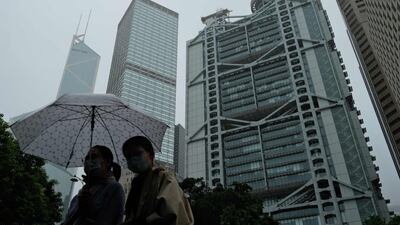HSBC fell short of profit estimates as Europe’s biggest lender signaled worsening loan losses weighed down by the global pandemic.
The lender has faced a challenging start to the year that had hit its worldwide operations, leading to a slump in earnings from its retail and corporate banking businesses, which was partly offset by rising income from its market division. The lender raised its estimate for 2020 loan losses to $8 billion to $13bn (Dh29bn-Dh48bn).
“Our first half performance was impacted by the Covid-19 pandemic, falling interest rates, increased geopolitical risk and heightened levels of market volatility,” chief executive Noel Quinn said in a statement.
The slowdown at the bank will increase pressure on Mr Quinn to speed up his planned overhaul that is expected to lead to the loss of 35,000 jobs as the lender looks to either turnaround or cut low-returning units.
Mr Quinn said on Monday that the bank now is looking at accelerating plans announced in February and looking at
additional measures to shore up its performance.
HSBC, which makes a bulk of its revenue in Asia, has found itself at the eye of a storm in recent months as it seeks to navigate worsening political relations between China and the US and rising tensions in Hong Kong.
To boost its profitability, the lender is seeking to pivot away from Europe and the US to expand its business in China as the nation opens up its capital markets.
HSBC second-quarter profit fell by 57 per cent from a year earlier, as expected credit losses hit $3.8bn. Adjusted pretax profit was $2.59bn, missing a $2.94bn estimate.
Revenue at its wealth and personal banking segment slid 12 per cent in the period, while its commercial banking area saw a 14 per cent drop. Like rival banks it saw a jump in income from trading amid volatile markets, posting a 24 per cent gain in the global markets division.
The latest results mark 12 months since HSBC surprised the banking world with the ouster of its then chief executive John Flint. Mr Flint had fallen out of favor with chairman Mark Tucker, who then appointed Noel Quinn to replace him as acting chief executive, before he was given the job on a permanent basis in March.

